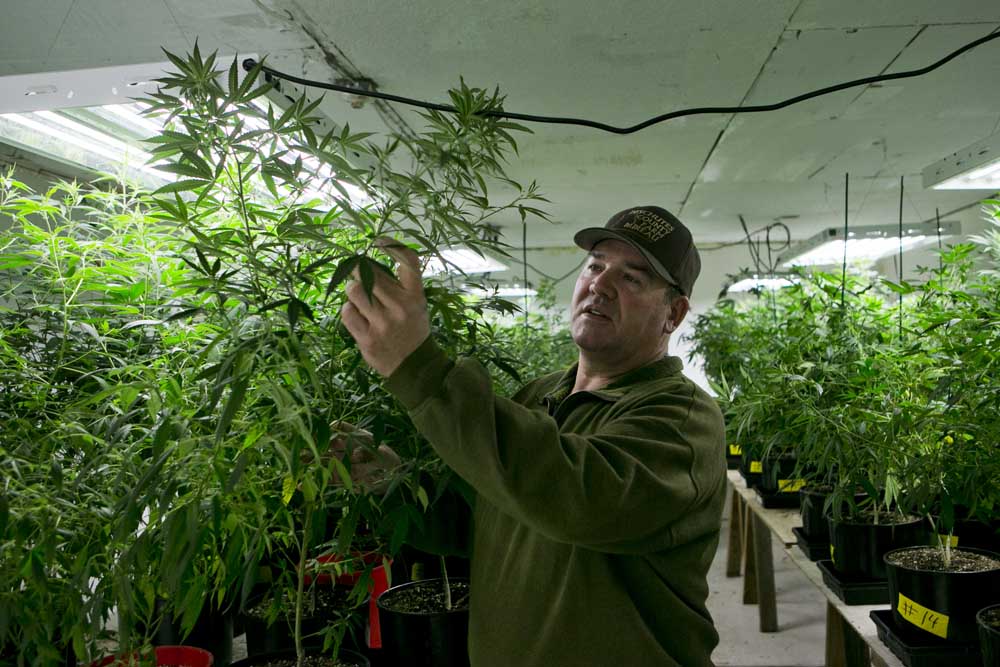Hemp growers wait for new rules
Published 12:00 am Thursday, April 19, 2018

- Matt Cyrus looks over some of the hemp plants he's growing in a greenhouse east of Sisters on Wednesday. (Joe Kline/Bulletin photo)
Industrial hemp growers who make cannabidiol, or CBD, wanted to be able to put their products where the consumers are — in retail dispensaries for recreational marijuana.
To do that they needed a law, which Gov. Kate Brown signed last week. As of Friday, any hemp growers or handlers who want to sell their products in Oregon Liquor Control Commission-approved stores will have to wait until the OLCC creates rules that will oversee the licensing of those CBD products.
It’s all about putting CBD products on the same regulatory path as marijuana, said Matt Cyrus, a hemp farmer and president of the Deschutes County Farm Bureau. When the rules are in place, hemp growers and handlers will be able to sell their products to any OLCC licensed retailer, wholesaler or processor.
CBD is a cannabis compound that does not have the psychoactive effects that make people feel “stoned” or give them a euphoric high.
Industrial hemp growers are regulated now by the Oregon Department of Agriculture, which certifies hemp products that could be transferred to an OLCC licensed processor, said Mark Pettinger, OLCC recreational marijuana program spokesman. The product that industrial hemp growers make, CBD, is not considered a federally regulated item.
“The hemp growers wanted access to our system,” Pettinger said. “They wanted to be able to package hemp to sell to our wholesalers and retailers. Under this legislation, now hemp is tracked in the cannabis tracking system.”
Hemp growers don’t have to go through the OLCC market, said Sunny Jones, Department of Agriculture cannabis policy coordinator. They can still sell their products to other retail outlets, or even online. This law, Jones said, only applies to hemp growers seeking to sell extracts, concentrates or raw products to an OLCC processor or retailer, she said.
The new law now will also standardize products sold in the OLCC system. CBD will be able to contain no more than 0.3 percent THC, a small fraction of the concentration found in marijuana. The products also must submit to a regular panel of tests for pesticides before being sold at an OLCC-authorized establishment. CBD can be sold online, at health food stores or farmers markets, Pettinger said.
It is believed that there are health properties associated with CBD that cut inflammation, pain and anxiety, and that it can be used to treat conditions such as arthritis, diabetes, depression and epilepsy, according to Project CBD, a California-based nonprofit that focuses on research and medical use of CBD.
“We’ll be able to expand our markets,” Cyrus said. “Guys can mix and match CBD and THC products based on what the customer wants. It’s a customer convenience; that’s why we’re trying to get into these stores.”
The Department of Agriculture’s online database shows 40 industrial hemp growers and handlers in Deschutes County.
Most hemp growers and handlers grow their product in the summer for the seeds and flower buds that are distilled into oils and CBD distillates, said Don Morse, Oregon Cannabis Business Council director. A few hemp growers and handlers, however, use hemp to create fibers and paper, Morse said.
Some hemp growers have opted not to go through the OLCC regulation, said Everett Novak, Tokyo Starfish store manager. The marijuana store in Bend is unable to carry those products now because of the new law, he said.
“CBD is one of the most high-demand products that people are asking for,” he said. “It’s like a healthier aspirin.”
Likewise, Nick Harsell, owner of High Grade Organics in Bend, said that while customers will have to find alternatives for their favorite products that opted not to obtain an OLCC endorsement, there are still many CBD products available.
“I appreciate the licensing and endorsement regulations,” Harsell said. “It will keep the products more local.”
— Reporter: 541-633-2117, sroig@bendbulletin.com








